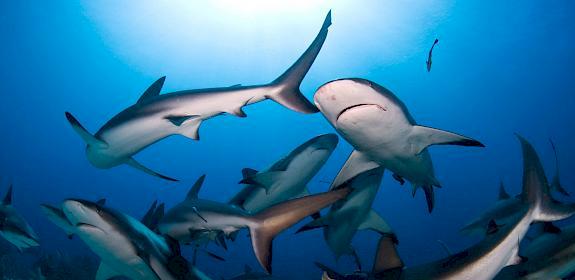The ongoing trade threatening tigers, pangolins, songbirds and sharks revealed in latest TRAFFIC Bulletin
2nd May 2018, Cambridge, UK—declining populations of sharks and rays, the threats posed by the anonymity afforded to traffickers online and the continuing crisis facing Asian songbirds are among the topics covered in the latest issue of the TRAFFIC Bulletin.
Now in its fourth decade, the Bulletin remains the only conservation journal dedicated exclusively to wildlife trade, featuring reports, analysis and insights into the world’s most pressing wildlife trade-related topics by specialists in their field.
High on the list of concerns facing conservationists and law enforcement agencies alike are the challenges posed by the increasing volume of illegal wildlife trade shifting to online platforms.
Giavanna Grein and Jing Chen of TRAFFIC report on the recent launch of the Global Coalition to End Wildlife Trafficking Online, which brought together major internet companies in the largest collaborative show of commitment against online illegal wildlife trade in history.
Seizures of tigers are also analysed in the paper A rapid assessment of Tiger trade in Viet Nam, which finds whole Tiger carcasses were the most common commodity seized in 2017, two of which were frozen Tiger cubs. These findings support historic trends previously reported by TRAFFIC and that much of the trade in Tiger products in Viet Nam occurs online, where traders face relatively little attention from enforcement agencies. As part of an overall need to tighten national regulation, the report urges the Vietnamese government to continue working towards intelligence-led law enforcement to shut down those facilitating the online illegal trade in Tigers.
There are currently only 3,800 Tigers left in the wild, where populations are under ongoing threats posed by illegal trade and poaching driven by demand for their products in Asia.
The Philippines is home to one species of pangolin, the Philippine or Palawan Pangolin Manis culionensis, currently listed as Critically Endangered. Another study in the Bulletin builds on previous CITES[1] reports that illegal trade in pangolins has increased in the region over the last decade. Analysis of seizure data between 2001–2017 finds that the plight of this shy, elusive creature may be as perilous as local conservationists feared. Collectively pangolins are maintaining their unfortunate status as the world’s most trafficked mammals.
Other topics cover the need to enhance China’s green procurement of legal forest products, a report on progress in enforcement activity among collaborators signed up to AFRICA-TWIX (AFRICA Trade in Wildlife Information eXchange) and a summary of recent wildlife seizures and prosecutions.
TRAFFIC Bulletin Volume 30 No. 1 is now available for download. Sign up to the Bulletin mailing list to receive future editions, news and updates direct to your inbox.
Convention on International Trade in Endangered Species of Wild Fauna and Flora (CITES)

The Convention on International Trade in Endangered Species of Wild Fauna and Flora, is an international agreement between governments that aims to ensure that international trade in specimens of wild animals and plants does not threaten their survival. Find out more here.





